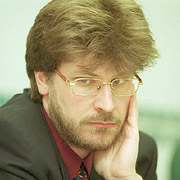© «Russia in Global Affairs». № 4, October — December
2005
 Of the many
Of the many
subjects of political debate in Russia in 2005, the main emphasis
has been on national sovereignty. The protection of sovereignty
against terrorists, destructive social elements, strategic rivals
and external competitors has been the primary focus of statements
made by the country’s top officials and political experts.
In light of sentiments within the Russian leadership, this past
year can be clearly divided into two parts. The first half was
marked by near panic calls for society to rally in the face of
threats to Russia’s sovereign existence. The nervousness derived
from a series of negative developments, the first being the
terrorist attack on Beslan; next was Moscow’s embarrassing defeat
in Ukraine where the Kremlin’s prot?g? lost in the presidential
elections. Other scenarios, such as instability in Central Asia,
attempts to revise the Soviet Union’s role in the war against Nazi
Germany on the eve of the 60th anniversary of the victory in World
War II, the harsh reaction of the West to the centralization of
power in Russia, and the guilty verdicts in the YUKOS case, only
exacerbated the feeling of an “enemy encirclement.”
Later, however, the psychological state of the Russian ruling
class began to change. And although there are no grounds to rest on
our laurels today – the way there were no extraordinary reasons to
fear for the country’s sovereignty and territorial integrity six
months ago – Russia’s position has really strengthened. A series of
global developments have added to the self-confidence of the
Russian establishment: the inability of the United States to solve
many of the global problems it has undertaken to address, the
ongoing crisis in the European Union, disillusionment with the
outcome of the ‘colored’ revolutions, the rapid rise of oil prices,
and the equally rapid rise of Asia. The recent ‘contract of the
century’ – the construction of a north-European gas pipeline that
will bring Russia and the EU still closer together – confirms that
Russia possesses a real resource, the importance of which is hard
to overestimate in the new century.
This issue offers a wide variety of views on the sources of
Russia’s sovereignty and threats to it, as well as Russia’s ability
to pursue an independent and effective policy.
Mikhail Leontyev describes Russia as one of the few countries in
the world that is capable of conducting a really independent
policy. He believes that the country’s sovereignty must rest on
might, which the Kremlin must now restore. According to Sven
Hirdman, to better understand Russia one must compare the
perception of the notions of the State, Society and Motherland in
Russia and West European countries. Vladimir Ryzhkov argues that
genuine sovereignty is impossible unless it relies on law and
democratic procedures. Valery Tishkov focuses on the formation of
the Russian people as the basis of a new national identity.
Russia’s identity must rest on its entire 1,000-year-long colorful
history, rather than on individual periods chosen out of short-term
political considerations, Sergei Kortunov writes. Ivan Sukhov
analyzes the situation in the Caucasus, a region that poses
the greatest threat to the integrity of the Russian Federation.
Leonid Grigoriev and Yulia Urozhaeva argue that the sovereignty of
this huge country can be strengthened only through the successful
development of its constituent regions.
Sergei Karaganov warns about the danger of ‘Eurasianism,’ that
is, Russia’s attempt to isolate itself from the fast-developing
global centers under the guise of an ‘original path,’ while Fyodor
Shelov-Kovediayev advocates the earliest possible accession of
Russia to NATO. Vladimir Milov analyzes Russia’s role in the G-8,
which will gather in St. Petersburg in 2006. He
believes that Russia will guarantee for itself the role as a key
energy actor on the global stage only if it proposes a joint
program for ensuring universal energy security to the developed
countries. Vlad Ivanenko discusses how distant the next chairman of
the G-8, Russia, is from the standards of this group of countries
and what consequences this factor may have. Vladimir Dvorkin
proposes ways to use the legacy of Russia’s strategic military
confrontation with the United States for the benefit of a
Russian-U.S. partnership.
Vladimir Frolov writes about dangers posed by elections in the
post-Soviet space, which often become instruments for replacing
power from abroad and thus violating the national sovereignty of
the post-Soviet states. Mikhail Delyagin draws a line under the
Commonwealth of Independent States – in his view, the incumbent
Russian authorities have wasted the chance for this country to
become the center of post-Soviet integration. Robert Saunders
discusses the phenomenon of ethnic Russians in a foreign state –
Latvia – following the breakup of the Soviet Union.
Finally, Vladislav Inozemtsev, the host of our journal’s new
section Personage, speaks with one of the most brilliant
intellectuals in Latin America. Fernando Henrique Cardoso, former
president of Brazil, which is often compared with Russia, speaks
about democracy, reforms and globalization.










